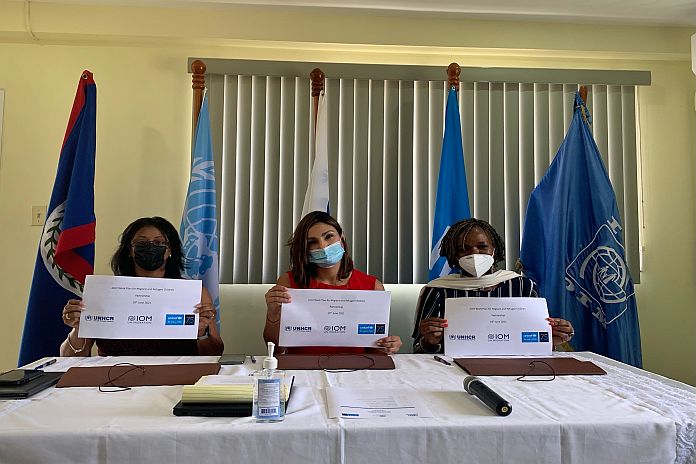By Government Press Office | BELIZE
BELIZE, Belmopan – The United Nation’s Children Fund (UNICEF), UNHCR, the UN Refugee Agency, and the International Organization for Migration (IOM) convened to sign the first joint work plan for migrant and refugees in Belize.
The work plan outlines strategic actions to protect the local population of migrants and refugees through advocacy and legal reform, and strengthening of data systems, technical capacities to improve response and provision of services to support their integration into Belizean society.
The plan also includes the development of minimum acceptable standards for service delivery in migrant and refugee-hosting communities and protocols to protect against statelessness.
The joint work plan, signed on June 10, 2021, seeks to build the capacity of government institutions to enhance birth registration, child protection, and to provide support with integration services. The Agencies will also continue community engagement through mobile hubs where asylum seeking, refugee and migrant families have access to services such as health and birth registration as well as information on asylum and migration procedures.
Birgit Gerstenberg, UN Resident Coordinator for Belize states: “The development of this Joint Work Plan illustrates the much-needed collaboration and coordination among agencies that will continue to be required in the design and implementation of new Multi-Country Sustainable Development Cooperation Framework (MSDCF) 2022 – 2026. This comes at an excellent time as it is recognized that the agenda for human mobility management will be a priority that requires partnership and collaboration between development partners, government, CSO and the UN entities at both the regional and national levels.”
Alison Parker, representative for UNICEF Belize, spoke of UNICEF’s commitment to protecting and empowering children and their families to contribute to our national development.
“UNICEF’s position is unchangeable. In any country – a child is a child, no matter why they leave home, where they come from, where they are, or how they got there. Every child deserves protection, care and all the support and services they need to thrive and become productive members of our society.”
Belize is home to 2,394 registered and an estimated 3,400 more unregistered asylum seekers and refugees, all of whom have the right to register the birth of their children in the country. Yet geographical and knowledge barriers are often obstacles for many.
“Statelessness affects millions of people around the world, including many children,” said Yolanda Zapata, UNHCR’s head of office in Belize. “While lack of documentation does not render someone stateless, birth registration of refugee and asylum-seeking children is a key element in preventing and mitigating the risk of not having a nationality.”
Diana Locke, IOM’s head of office stated that: “IOM recognizes the need for migrants and especially those in vulnerable positions to have access to accurate information and services enabling them to navigate the migration process. It is our hope to partner with government and stakeholders to ensure a safe, orderly and dignified migration process.”
Through coordinated efforts by our three UN agencies, we will help to strengthen the assistance to these persons, working together with the government and local agencies enabling a comprehensive approach to refugee and migrant integration into Belizean society.
The joint UN agencies calls for seven actions to protect all refugee and migrant children:
- Endorse and Implement the comprehensive national Migration Policy, and the adoption of standard operating procedures to address the needs of migrants and refugees;
- Press for action on the causes that uproot refugee and migrant children from their homes;
- Ensure uprooted refugee and migrant children have access to basic social services including language-specific education and quality health care;
- Guarantee that families are kept together and give refugee and migrant children legal status;
- End the detention of refugee and migrant children by creating practical alternatives;
- Combat xenophobia and discrimination;
- Protect uprooted refugee and migrant children from the heightened risk to abuse, exploitation and violence:





